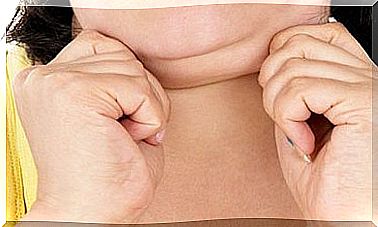The 5 Possible First Symptoms Of Tongue Cancer
Tongue cancer, technically known as oral and oropharyngeal cancer, is one of the less common types of cancer. In most cases, people with tongue cancer are or were lifelong smokers or alcohol users.
Statistics indicate that it occurs more in men than in women and that in recent years, the number of patients diagnosed with oral and oropharyngeal cancer has increased.
Like any disease, in its initial stage it presents certain symptoms that are indicators that something is happening. If you suspect that you are having tongue cancer, here we bring you the first 5 symptoms of this pathology.
It is important to emphasize that these symptoms are the most general, they are not 100% indicators that you are suffering from cancer. Remember that if you have any discomfort, you should go to the doctor to carry out the corresponding tests and give a proper diagnosis.
Risk factors for tongue cancer
According to experts from the American Cancer Society, these are the main risk factors for tongue cancer. Take note!
1. Smoking

Because they are harmful to health, both alcoholism and smoking are among the main risk factors for several cancers and other diseases. For this reason, it is also part of the list of tongue cancer.
Stanford Children’s Health experts say the following about regular tobacco use:
Toxic substances weaken the immune system and damage cells, making the body more vulnerable to disease, say experts from the Centers for Disease Control and Prevention (CDC).
2. Alcoholism
The scientific community agrees that, like tobacco, alcohol consumption increases the risk of all kinds of diseases, including tongue cancer.
In this regard, the team of the National Cancer Institute comment the following:
So, the more alcohol and tobacco a person consumes in their day to day, the greater the risk of developing tongue and other cancers. Therefore, health experts comment that the ideal would be to dispense with these harmful habits.
3. Bad diet
A poor diet is harmful in many settings because it does not provide the body with everything it needs. In this sense, scrap metal can satisfy the appetite, but it does not contribute anything to health in the short or long term.
A poor diet of fruits, vegetables, and greens has been shown to increase the risk of tongue cancer and many other diseases.
4. Human papillomavirus (HPV)

People affected with HPV are more likely to develop tongue cancer because this virus is directly linked to its appearance and development.
According to the CDC data, many people are exposed to HPV throughout their lives. It can infect the mouth – and therefore the throat – and cause tongue cancer. “HPV is believed to cause 70% of oropharyngeal cancers in the United States.”
Possible symptoms of tongue cancer
Oropharyngeal cancer affects the mouth, throat, and tonsils. The involvement of the base of the tongue is notorious. Here are some symptoms that could indicate that something is wrong and that it is time to check with the doctor.
1. Sores on the tongue
The appearance of really painful sores, ulcers or canker sores that are difficult to eliminate with treatment is one of the first symptoms of oral or tongue cancer. Usually the sores are painful and very annoying, but you will recognize these because they are much more sensitive and appear very frequently.
It is important not to confuse them with normal sores or oral or oral herpes, therefore pay attention to the level of pain and its duration.
2. Pain

The pain caused by tongue cancer is not only focused on this area, but it can also radiate to the mouth in general and the throat.
- It can occur in simple, everyday tasks like drinking fluids and chewing food.
- Depending on the pain, both when swallowing and chewing, it can be an indicator of this pathology, although it can also be due to throat infections, tonsillitis or allergy.
Therefore, be very aware of the intensity of the pain and its duration. If it lasts more than a week and presents other symptoms, such as spots on the tongue, the best option is to go for a medical check-up to obtain a diagnosis.
3. Stains on the tongue
These spots are another great indicator of being suffering from tongue cancer. They are usually white (leukoplakia) or red (erythroplakia) and last more than two weeks. If this is your case, it is important that you go to the doctor to find out what it is about. If the specialist considers it necessary, he will order a biopsy to analyze the content of the spots.
4. Bad smell
It is very common to have a bad smell in the mouth after the above symptoms. It can be removed with brushing, but sooner or later it will return and may be accompanied by a taste of blood.
5. Blood on the tongue

Many people have bleeding in the tongue area and mistake it for bleeding gums or ulcers. It is very important to determine where the blood is coming from.
- Clean your tongue after eating with the help of a cotton ball to make sure where it comes from.
- Similarly, see a doctor if you constantly taste blood in your mouth.
What should be done in case of having these symptoms?
It must be taken into account that the symptoms to be mentioned are not only of this type of cancer, but they can be a consequence of other diseases. In case you experience them, the American Society of Clinical Oncology recommends going to the dentist or dentist for a routine exam.
It is important to note that people with oral cancer may have some symptoms, but this is not always the case. Therefore, when in doubt, it is best to consult with the dentist.
Nelton Abdon Ramos Rojas
Graduated in Medicine from the Universidad de los Andes (ULA), Mérida, Venezuela, in 1993. For more than 25 years, Dr. Nelton Abdón Ramos Rojas has been a surgeon. For a long period, she was a gynecology and obstetrics care resident at the Sor Juana Inés de la Cruz Hospital in Mérida. In 1999 he entered the postgraduate course in Anesthesiology at the Universidad de los Andes where he graduated in 2002. He has extensive experience in the management of perioperative pain. Bariatric Anesthesiologist. In addition, Dr. Nelton Ramos is co-founder of the Samuel Dario Maldonado Maternal and Child Hospital in Barinas (Venezuela): he has been acting as chief of the operating room for 4 years. He is currently in private practice.








